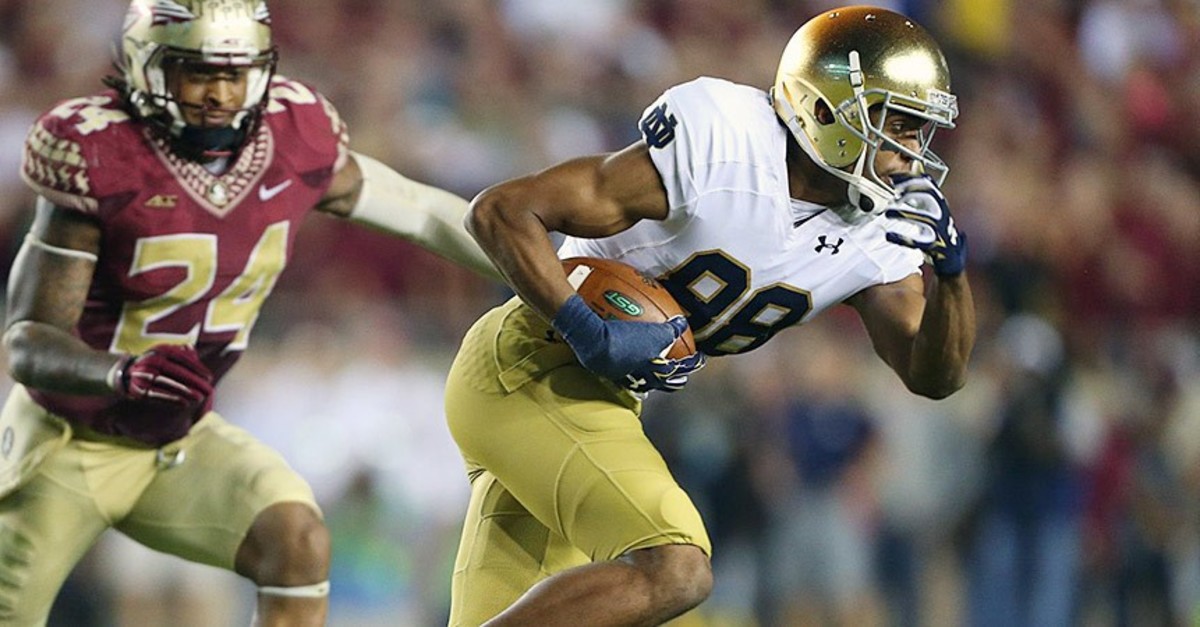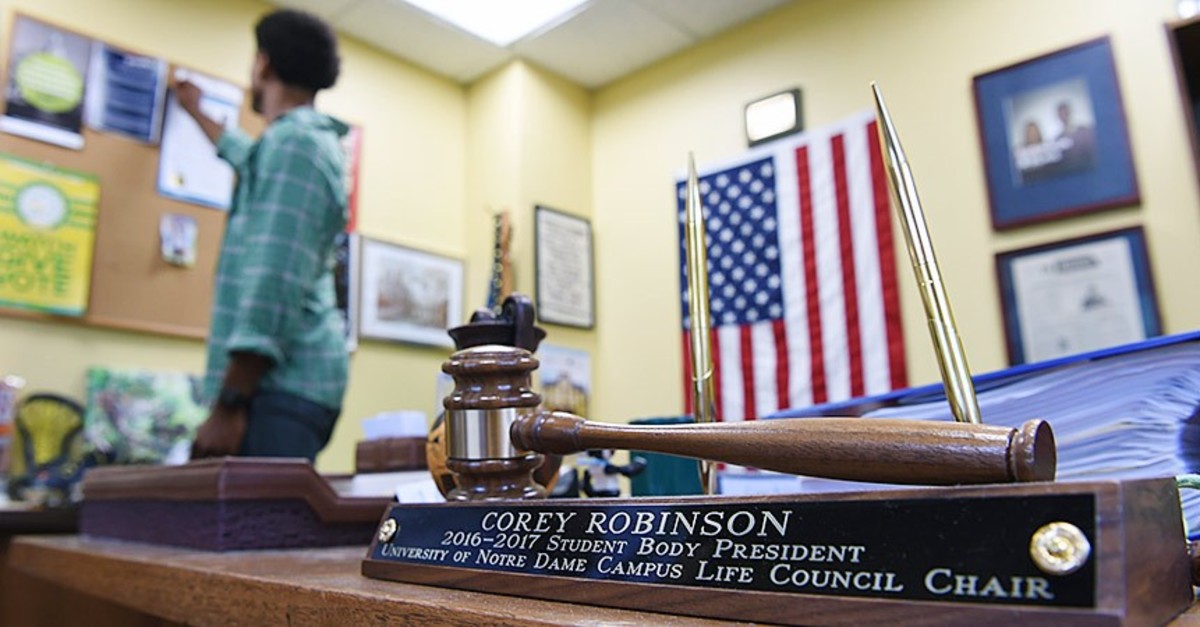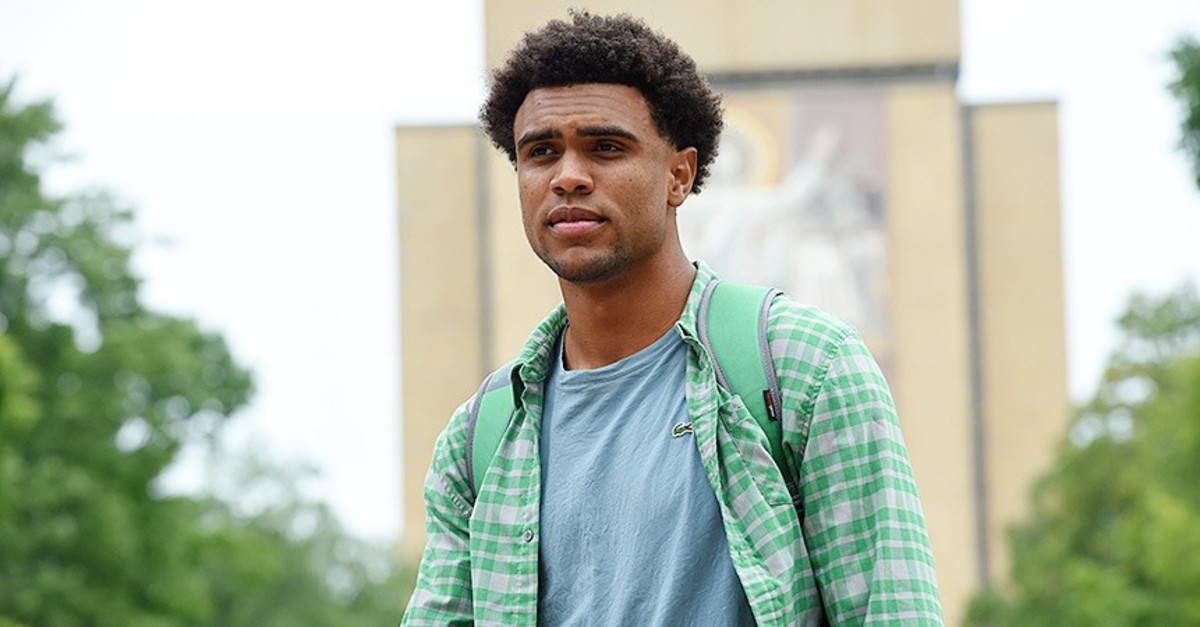Too smart for football? Corey Robinson passed on another season at Notre Dame to embrace all that he can offer

[video: 13724765]
This story appears in the Oct. 17, 2016, issue of Sports Illustrated. Subscribe to the magazine here.
Corey Robinson glides across the Notre Dame campus on a longboard, clad in jeans shorts, a pullover and bright-yellow flip-flops. It's a sun-splashed Thursday in late August, and Robinson stops at least a dozen times for fist knocks with football players, bro hugs from classmates and conversations with professors. The longboard allows him to weave through his worlds at Notre Dame—academic, political and athletic.
Outside South Bend, Robinson is best known for what he isn't—a star wide receiver for the Fighting Irish. After Notre Dame's loss to Ohio State in the Fiesta Bowl last January, Robinson, the son of NBA Hall of Famer David, decided to graduate early with a degree in liberal studies and enter the work world. But a few days later the opportunity arose to run for student body president. He decided to return to Notre Dame, run for office, play his senior year of football and give back to the campus that he feels gave him so much.
In February he won the election (on a campaign built on five pillars—community engagement, sexual assault prevention, health and wellness, diversity and inclusion, and sustainability), and as spring practice began in March, the 6' 5", 214-pound Robinson projected as the team's No. 1 receiver. In three seasons the former four-star recruit from San Antonio Christian High had caught 65 balls for 896 yards and seven touchdowns, and coach Brian Kelly said that Robinson could be a second- or third-round NFL draft pick. Then he suffered his third career concussion.

Jason Parkhurst
He deliberated over his football future for two months. He saw a specialist, who cleared him to return, but Robinson couldn't accept the long-term risk. In June he announced that he was ending his playing career. Today Robinson is careful about how he discusses the game: He doesn't want to be a lightning rod in the concussion debate. "It was difficult to step away," he says. "I've always been an athlete. And to give that up was extremely daunting." But, Robinson goes on, "the looming factor of brain damage, to me, was too strong."
As Notre Dame sputters to a 2–4 start, Robinson doesn't spend any time wondering what could have been. Those around him are wondering much more about what will be. "From my perspective," Kelly says, "this story has so much more depth than, 'I got a concussion and I quit.'" Robinson is a Rhodes scholar candidate that his student government friends know as a "tea connoisseur" who's in bed every night by 10:30. But he also sings and plays guitar in a campus band, Rolf's Aquatic, that's managed by Jesse Bongiovi, son of musician Jon Bon Jovi, and in the last year he has recorded an album and written a screenplay and a thesis. He keeps his iPhone calendar in Portuguese, for practice. His father was caught off guard earlier this year when he took a call from Corey's secretary in the student government office. "He constantly surprises me," says the Admiral, "and I love it."

Matt Cashore
The first football player to be POUND (President of UND) since at least the 1920s, Robinson is also a student assistant with the football team. "It's an interesting juxtaposition," he says. "Being student body president and leading others and learning how to effectively help people on the team in a way that's not as direct." He considers his life at Notre Dame a manifestation of all football has provided: a world-class education, teammates who will become friends for life and a stimulating campus environment. "It's given me everything," he says of the sport.
His attempts to give back so far include the creation of Race Relations week, which starts on Oct. 24 and will feature David Krashna, who became the school's first African-American student body president in 1970. (Robinson is the second.) He has pushed to make rape kits available on campus, and he has spearheaded an overhaul of the student shuttle services and efforts to improve the campus climate for innovation. "That's what university life is all about," he says. "Challenging, questioning, enjoying good people and good friends and pushing yourself to the limit."
HAMILTON: USC's Helton preaches incremental improvement to impatient Trojans
Corey's varied interests link to his father's. To Corey, David is more of a businessman and philanthropist than a 10-time All-Star. After retiring in 2003, when Corey was eight, David earned a master's in administration from the University of the Incarnate Word, cofounded a private equity company (Admiral Capital Group) and started a school in San Antonio, Carver Academy. Corey and his younger brother, Duke basketball player Justin Robinson, attended Carver, which is largely populated with lower-income students. "Seeing where some of these kids came from and what family life was," says David, "he learned lives were really different, and it made him more compassionate."

Matt Cashore
When Robinson returned to campus last winter, he had 10 days to put together his campaign for presidency. Vice president Rebecca Blais, Chief of Staff Michael Markel and a handful of teammates and friends scrambled. They constructed a platform, printed out paraphernalia and Robinson personally knocked on every door of 20 of the school's 29 dormitories. For every student who felt passionate about an issue, there were others who wanted selfies, offered up a game of Super Smash Brothers or even a beer. Robinson worked so hard he lost 10 pounds over two weeks. During a moment of high stress, Blais recalls, Robinson group texted a bible verse from Ephesians. "I urge you to live a life worthy of the calling you have received."
Robinson treasures that frenetic time, the days of skipped classes and the nights that lingered past his preferred bed time. He and teammate Scott Daly walked out of a dorm at 11:30 p.m. after a night of campaigning, to a steady snowfall. "Look at the Dome right now," Robinson said of the school's iconic Golden Dome. "These are the types of moments we're going to remember from our Notre Dame experience."
As Robinson details plans for his presidency over a plate of jerk chicken at Yats, a cozy Cajun dive near campus, his diverse passions are obvious. He has studied in or gone on mission trips to South Africa, Brazil and the Middle East. His thesis involved "applying world philosophy to environmental policy making." If Robinson doesn't study at Oxford, he'll look into a career in sustainable investment. Other than his term at Notre Dame, politics is unlikely. "I've never seen anyone who so genuinely never sees limitations," athletic director Jack Swarbrick says. "Athletics will be a small part of his legacy. And that's exciting."
